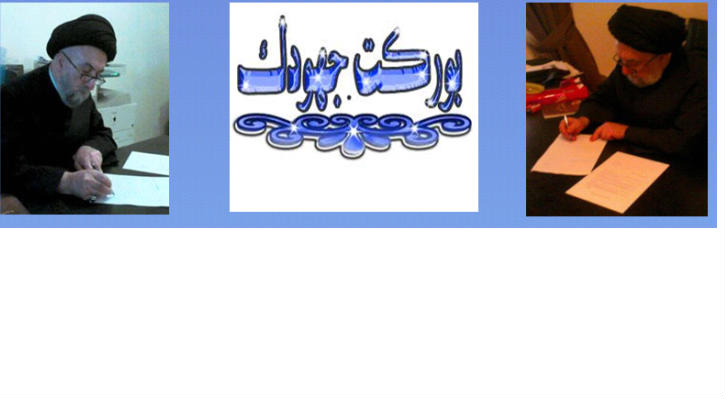| sami | التاريخ: الخميس, 2013-05-23, 11:22 AM | رسالة # 1 |
 عضو مؤسس
مجموعة: المدراء
رسائل: 1054
| Hizbullah intervention in Syria unacceptable and the religious leaders in the Arab countries have to come out of silence and issue fatwas prohibiting participation in the fighting in Syria
ــــــــــــــــــــــــــــــــــــــــــــــــــــــــــــــــــــــــــــــــــــ
Grand Sholar Al-Amine:
Hizbullah intervention in Syria unacceptable and the religious leaders in the Arab countries have to come out of silence and issue fatwas prohibiting participation in the fighting in Syria
17 / 05 / 2013
By Ayoub Khaddaj in Beirut
ـــــــــــــــــــــــــــــــــــــــــــــــــــــــــــ
Transcript of the interview conducted by Al-shorfa website withGrand Sholar Sayyed Ali Al-Amine:
Al-Shorfa: Hizbullah says it is involved in the conflict in Syria to defend Lebanese Shia living in border villages and religious shrines. What do you think of this argument?
Sayyed Ali al-Amine: This stated reason for Hizbullah's intervention in the on-going fighting on Syrian territory is unacceptable from both a religious and legal standpoint, because the responsibility for defending sacred religious shrines and Lebanese nationals on Syrian territory rests with the Syrian regime alone, not Hizbullah or the Lebanese government.
If the Syrian regime is incapable of protecting them, then it would be better for them to leave those villages until the war ends, because our religious foundations tell us fleeing sedition is better than embroiling ourselves in it.
In our view, jihad is defending our homeland, Lebanon, building our nation and preserving our co-existence and national unity. Sayyeda Zeinab does not want bloodshed in the name of defending her shrine, but rather unity and shunning sedition, as is well known about her and her parents and ancestors.
Al-Shorfa: How does Hizbullah's intervention in the Syrian conflict impact relations between sects in Lebanon and the region?
Al-Amine: In light of the fighting in Syria, which at some junctures is starting to take on sectarian overtones, Hizbullah's intervention -- even under the banner of defending the Syrian regime and Lebanese nationals -- will lead to more sectarian tension inside and outside Syria.
This is because Hizbullah has a religious identity and sectarian affiliation that differs from that of the surrounding environment, which supports the Syrian people, who are demanding rights and reforms. This pulls the conflict into the arena of sectarian hostilities and consequently harms the co-existence that exists among sects in Lebanon and the region.
Al-Shorfa: Are there Shia voices in Lebanon and abroad against Hizbullah's intervention into the Syrian conflict?
Al-Amine: Some voices recently expressed their rejection of Hizbullah's -- and other groups' -- intervention in the on-going conflict on Syrian territory. Though they are individual voices, they show there is a movement that is growing steadily -- especially within the Shia community in Lebanon -- which rejects involvement in the war in Syria, despite the state not embracing subscribers to this view who defend the state and demand that it extends its authority over all Lebanese territory.
Al-Shorfa: Since Iraqi Shias are also participating in the Syrian conflict on the side of the regime, what should be done to prevent a sectarian flare-up?
Al-Amine: Religious leaders in Iraq must end their silence and issue fatwas prohibiting involvement in the fighting in Syria. The same is required of religious leaders in Egypt, Saudi Arabia and other Arab and Muslim countries, because we cannot achieve moderation by remaining silent about the rise in extremism and tension, which are detrimental to the region and the world.
Al-Shorfa: How do you view Iran's role in respect to what Hizbullah and some Iraqi Shias are doing in Syria?
Al-Amine: Iran's quest to maintain its influence in the region drives it to demand that parties affiliated to it in Lebanon and Iraq stand by the Syrian regime and take part in the conflict on Syrian territory.
Al-Shorfa: There are groups linked to al-Qaeda, such as Jabhat al-Nusra, which are actively involved in the conflict. How do you view their role and the agenda they bring to the Syrian conflict?
Al-Amine: The entry of these non-Syrian organisations into the conflict has undermined the legitimate demands of the Syrian people, because these organisations have their own ideologies, which the international community and the majority of the Syrian people reject.
By adopting an extremist approach and rejecting others on the basis of erroneous religious premises, they are trying to leave their own imprint on events, heightening the threat of the spread of extremism and a culture of violence, not only in Syria but the entire region.
Al-Shorfa: How can the people in the region protect themselves against the extremism of groups like Jabhat al-Nusra and Hizbullah?
Al-Amine: The people in the region, like others in the world, want moderation, stability and to live in peace with each other and the world. What helped extremism emerge in some societies was the tyranny some governments and regimes exercised over their people, denying them social justice and fundamental freedoms.
This, in addition to the inability of some governments to fulfil their duties in enforcing their authority, disseminating their culture and regulating the activities of [political] parties, has created a climate conducive to the emergence of extremism. Additionally, by considering the continuous tragedy of the Palestinian people and the failure to find a just solution for their struggle. It is imperative the people of the region support the forces of moderation, make their voices which refuse hatred and conflict heard, and work to create a civil state founded on justice and equality for all citizens.
Al-Shorfa: Have you been in contact with Shia or Sunni religious leaders to discuss the possibility of helping to contain sectarian flare-ups in Lebanon and the region? If not, are there plans to do so?
Al-Amine: Yes, I have had several meetings and contact with a number of scholars and thinkers to hold a conference of religious authorities and people of opinion and thought from various sects to study positions that must be taken to stop the threats facing us and the region.
Source

|
| |
| |

